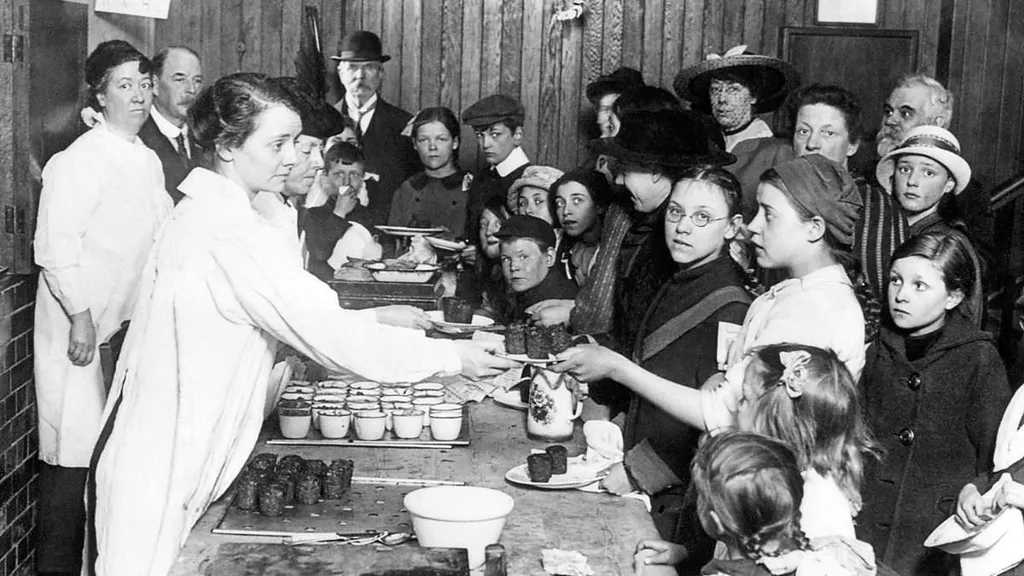World War II style kitchens will open in the UK selling meals for as little as £3 to help disadvantaged areas.
The taxpayer-funded project is set to be launched in Nottingham, with a second venue in Dundee, offering cheap and nutritious food.
Subsidised communal kitchens were common in the 1940s and would include a cup of tea costing one pence as well as bangers and mash at around sixpence.
They were intended as communal spaces for Britons who'd had their homes bombed and needed a hearty meal.
The two new not-for-profit sites will be the first of this generation as there are currently no government-subsidised restaurants in the UK after most closed by the 1960s following the end of rationing in 1954.
They will focus primarily on feeding children, operating as a normal restaurant for at least five days a week and the cost of a meal will only marginally exceed that of the ingredients.
More than £1.5million of taxpayer money is set to be pumped into the 12-month pilot project which aims to tackle food poverty and malnutrition.
Anna Chworow, the deputy director of Nourish Scotland, which is conducting the study alongside the University of Sussex, said the meals were expected to cost between £3 and £5.
Pictured: A communal 1940s kitchen in operation. World War II style kitchens will open in the UK selling meals for as little as £3 to help disadvantaged areas
Members of the public enjoying a meal in one of the chain of British Restaurants established during the Second World War, London, 1943
3rd October 1940: A communal feeding centre at Millbank School, London, where people could obtain substantial meals at cheap prices
She explained: 'From the customer end, this will feel like an ordinary restaurant - albeit with low prices. The subsidy mostly supports staff costs and overheads, and this in turn keeps the prices low for everyone.
'Each meal is priced slightly above the cost of ingredients used to make it, meaning the more popular the restaurants are, the more economically viable they become.'
Countries like Poland and Turkey already run similar schemes and the scientists behind Britain's pilot sites hope they will provide a blueprint for more restaurants to open in the coming years, which would be funded by local authorities.
Location, cuisine, meals, and pricing would be decided in talks with the local community though it is unknown how the food would be sourced.
However, researchers are hoping to prioritise local produce on the project, for which a contract is expected to be tendered later this year.
Ms Chworow explained under the pilot funding would be given to the caterer - the operator of the restaurant.
But it is imagined the central government funding would be transferred to the local authority in future, with pilot sites also potentially operating 'slightly differently' to the eventual roll-out.
The Department for Science, Innovation and Technology has announced more than £8 million in funding for six different projects, with one being the subsidised restaurants.
The Ministry of Food handbook criticised the "appalling ignorance" of British people when it came to preparing food, advising that more vegetables should be introduced to the diet through national kitchen menus.
The government was keen to avoid the stigma of poverty associated with soup kitchen hand-outs, but also wanted to utilise the volunteer-run community kitchens springing up in working class communities to help deal with food shortages.
Another project includes a mobile greengrocer, dubbed the 'Queen of Greens', visiting areas of Liverpool where social housing residents have limited access to nutritious food.
Peter Kyle, the Science and Technology Secretary, said: 'No one in this country should be left unable to access the healthy food they need.
'These projects will draw on the power of research to actively explore the best ways to get healthy food into the mouths of those who need it, potentially having a transformational effect on people's lives, and fulfilling the missions set in our Plan for Change.'
